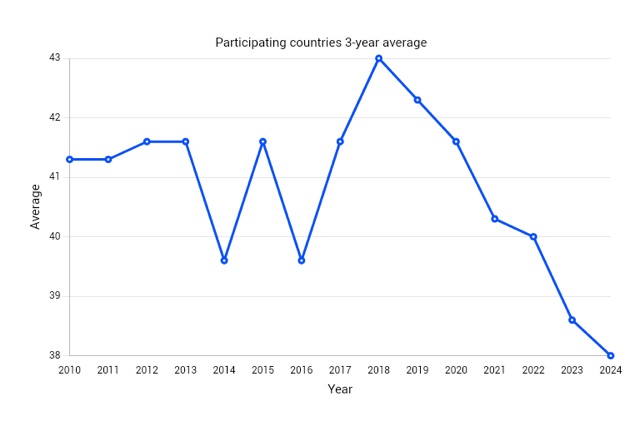Going, Going, Gone
Over the past decade, several countries have disappeared from the roster as broadcasters left the Eurovision Song Contest for various political or financial reasons.
Turkey and Slovakia last appeared in 2012, although the latter could potentially return in 2025. Bosnia & Herzegovina haven’t shown up since 2016 because of financial constraints. Hungary left in 2019. Belarusian broadcaster BTRC was suspended in 2021 for breaching Eurovision and EBU rules, and the following year, the EBU decided to suspend representatives from its three Russian members, forcing them out of the Song Contest.

Eurovision entries, three-year rolling average (Hayden Kent)
Then, last year, Bulgaria, Montenegro, and North Macedonia decided to sit out the 2023 Contest in Liverpool, citing rising costs. None of them are returning to Malmö. And now Romania has joined them. So, in that period, we have lost ten countries. But how many have we gained? Just two: Australia in 2015 and Luxembourg in 2024.
Those Rising Participation Costs
Obviously, this creates problems. The cost of running the Eurovision Song Contest must be spread out among fewer broadcasters, increasing participation fees. And this is at a time of economic difficulties and ever-tightening broadcaster budgets. So, more broadcasters withdraw, pushing up costs for others still further.
But what can be done to at least ease the problem? Well, I have two things to consider.
First, sponsorships. The Song Contest already has plenty, and there will be a saturation point somewhere. There are only so many social media exclusives, Eurovision Village kiosks, and cruises the EBU can put on the table. There may be room for one or two more sponsors. With the former TikTok partnership and the addition of Royal Caribbean this year, the EBU are willing to explore different options to bring brands on board.
Secondly, get more countries involved. Realistically, this is easier said than done. Broadcasters will only participate if they feel it’s value for money. It falls to us fans to let these broadcasters know that there is indeed an audience for the Contest in their respective country and an interest in seeing their culture represented on this international stage, and therefore participating is a worthwhile investment.
Such efforts do work, as illustrated by the return of Luxembourg. For 30 years, broadcaster RTL said, ‘Thanks, but no thanks’ due to the cost of participating, less than desirable results at the end of their previous run, and lack of interest. However, as a result of financial support from the government, community interest, and interest from both the broadcaster and the Luxembourgish music industry, RTL is back.
Also, is it possibly time to put our purist ‘such-and-such is not in Europe’ ideology aside and accept a limited number of associate members? Maybe not in the same way as SBS in Australia, who appear to be here for good. But what about having a slot for Associate Members to rotate? Perhaps it will be South Korea’s KBS one year and Brazil’s TV Cultura the next.
Those Smaller Semi Finals
One visible consequence of fewer participating countries is the smaller Semi Finals; having more than two-thirds qualifying for the Grand Final is …a choice.
Is it worth altering the rules so that if fewer than 15 countries are in a semi-final, then only nine qualify rather than ten? Obviously, the EBU wants as many broadcasters in the Grand Final as possible. While a line-up of 24 may make more sense competitively in a year where fewer entries are in both Semi Finals, fewer broadcasters can showcase themselves to the larger audience the Grand Final draws. It also has a noticeable impact on the show; it’s not uncommon for countries to see lower ratings for the Grand Final in the years they don’t make it.
One meet-in-the-middle idea is that if both semi-finals had nine qualifiers, rather than the usual ten, whichever tenth place got the highest proportion of points in their semi-final could still advance to the Grand Final with a wildcard pick. Using 2023 as an example would mean Estonia would have qualified while Serbia would not, as Estonia received a bigger proportion of the points available. A Grand Final of 25 isn’t unheard of in this era, as in 2022.
Let’s Keep Eurovision Thriving
A few years ago, the idea of pre-recorded backing vocals would have been unthinkable, but now, while there are some stalwart holdouts, many fans have accepted them, willingly or begrudgingly. And who would have guessed that people in non-participating countries would be able to vote, too? A radical idea certainly, but one that has been for the good of the Song Contest.
The Eurovision Song Contest evolves and adapts to keep up with the times and counter unique circumstances. When the COVID-19 pandemic meant some delegations might be quarantined, live-on-tapes were prepared to ensure those artists could still participate. One country hosting on behalf of another was something that had not been seen since 1980 …until Liverpool 2023, but it was an ideal solution following Ukraine’s victory in Turin 2022.
New technologies such as 4K broadcasting, Next Generation Audio, and the use of AI are currently being explored and tested. The Eurovision Song Contest has thrived for seven decades, and if it’s to continue to do so the EBU will have to carefully consider new ideas to deal with the varied issues that happen every year.










I have thought for a number of years now that there should be an invited guest broadcaster each year. Now that the Rest of the World votes, this makes even more sense. Kazakhstan should also be allowed to compete. I personally miss Bosnia Herzegovina, such good songs.